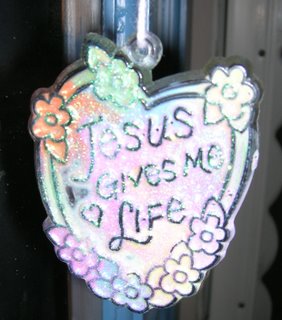Okay, so, like I mentioned earlier, I just finished reading
Scandal of the Evangelical Conscience by Ron Sider. And just before that I read
God's Politics by Jim Wallis. So, there is a lot of stuff Rattling Around. Please forgive me if I start rambling.
One of the things that stuck with me most from
Scandal is how we define the gospel and salvation. Sider says:
I am convinced that at the heart of our problem is a one-sided, unbiblical, reductionist understanding of the gospel and salvation. Too many evangelicals in too many ways give the impression that the really important part of the gospel is forgiveness of sins.While he does agree that forgiveness of sins is, in fact, very important, he goes on to say:
Justification and sanctification are both
central parts of the biblical teaching on the gospel and salvation. To overstate the importance of the one is to run the danger of neglecting the other. And that is certainly what popular evangelicalism has done.... we have propagated the heretical notion that people can receive forgiveness without sanctification, heaven without holiness.It's made me wonder about the answer I would give if someone asked "what is the gospel?" And it makes me wonder about the ways we, as the Church, present the gospel to unbelievers. Do they come away with a sense that the gospel is simply fire insurance? Do they see us living truly transformed lives (ie.
living out the gospel)?
And what of new believers? I think the Church as a whole needs to be strengthened in the areas of accountability amongst believers as well as discipleship. It can't be enough to "get people saved" and leave it at that. The Church should be a community made up of people who know how to nurture one another and spur them on towards Christ-likeness.
I know I am a cynic, but does it seem like the majority of believers are not willing to form the kinds of relationships that this would require? Or, if they are willing, are they equipped for those kinds of relationships?
I'll answer for myself. No, and no.
In regard to our reduction of the gospel to "the forgiveness of sins," Sider notes that Jesus never defined the gospel this way. Instead, he says, Jesus always spoke in terms of the kingdom of God. (In Luke 4:43, Jesus says, "I must preach the good news of the kingdom to the other towns also, because that is why I was sent.") He points out that, in their gospel accounts, Matthew and Mark both describe the gospel in the same way. Then he illustrates this point by quoting the scriptures in which Jesus sent out his followers on mission trips. Jesus told them to tell the people that the kingdom of God is near. Then he instructed them to heal the sick, raise the dead, etc. (See
Matt 10:7-8 and
Luke 10:8-9.)
I think the biggest thing that got me from this book is probably the hardest to describe. It has me wondering if western Christians really do get it at all. (And I am referring to myself here too.) Let me see if I can explain, in a rambling sort of way.
I hear lots of Christians say things like, "it's okay to have nice things" when we talk about materialism. That seems to be what we all want to hear. That way we are off the hook when it comes to examing our spending and our desire to accumulate stuff.
But, y'all, we are so steeped in consumerism here in the west that I think most of us have bowed to it and don't even realize it. You know, it IS okay to have nice stuff. God blesses us with material things sometimes. But the Bible is clear. It is NOT okay to have stuff in excess when others (billions of others, by the way) don't have basic comforts and the assurance that their needs will be met. Is it really okay to have 150 DVDs at our disposal, when people all over the world can't even afford adequate health care.
Sider makes the historical generalization that mainline Protestants have generally protested social sins (eg. economic injustice, slavery,) while evangelicals denounced personal sin (eg. stealing, adultery.) For the most part, I have found that to be true in my own experience. Christianity, in my evangelical experience, has always been about dealing with my personal transgressions. But, it is ALL OVER Scripture, that God is none too happy with his people when they turn a blind eye to economic and social injustice.
Jim Wallis made the point in his book that God, in the practice of Jubilee, set up a system that maintained equity. And, though ownership of personal property was allowed, it was always trumped by the concept of equity. Personal gain was always trumped by what was best for society. (And I am speaking very generally here, because I returned that book to the library a long time ago, so I can't give you any specific quotes.)
Moreover, Wallis went on to say that helping people out of systems of injustice is good. But, he warned that, as the Church, we need to work towards changes in society so that unjust systems are no longer pulling people under. In other words, we do need to help people who are poor by giving them sustainable income, but we also need to change the laws, trade practices, and personal habits which contribute to their marginalization.
To sum up, both Sider and Wallis make the point that Christianity is meant to be counter-cultural. I am still trying to grasp what that means for me personally, and what that would look like for the Church as a whole. Here is what Sider says:
The church is a new, visible social order. It is a radical new community visibly living a challenge to the sexual insanity, the racial and social prejudice, and the economic injustice that pervade the rest of society.I have no idea if this post makes sense. It is my first attempt to put this all into words, so I covet your comments. I am also thinking of reading
A Peculiar People. If any of this is of interest to you, perhaps we could read together and post thoughts on our blogs (or my comments section, if you don't have one.)
Gimme what you got.
Labels: Books


 at
at 





































